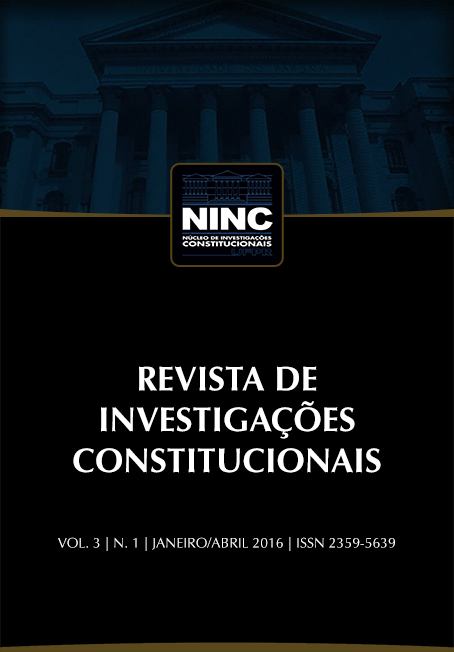Between global consensus and local deviation: a critical approach on the universality of human rights, regional human rights systems, and cultural diversity
DOI:
https://doi.org/10.5380/rinc.v3i1.45109Palavras-chave:
human rights, universality, cultural diversity, regional systems, global systemResumo
The global human rights regime, rooted in the Universal Declaration of Human Rights, nurtures a relatively uncontroversial consensus when it comes to the core principles and ideals of individual dignity and equality that stem from International Human Rights Law. Nonetheless, despite the longstanding and well-known debate concerning universalism versus cultural relativism, there still exists a thin and rather complex line between the universality of human rights on the one hand, and the respect for local practices and traditions on the other hand. This tension is further translated into the coexistence and overlapping between the universal and the regional systems for the protection of human rights, notably because the latter reflects an attempt to strengthen the protection of basic rights while underlining regional characteristics and common values shared by certain States, as opposed to an overarching, central scheme accused of overlooking the features of each region. Against this background, this brief research explores and, ultimately, rejects the claim that regional human rights systems hinder the successful protection and promotion of human rights at the regional level and undermine the effectiveness of the United Nations system.
Referências
ADDO, Michael K. Practice of United Nations Treaty Bodies in the Reconciliation of Cultural Diversity with Universal Respect for Human Rights. Human Rights Quarterly, vol. 32, n. 3, p.601-664, August 2010.
American Anthropological Association. Statement on Human Rights. American Anthropologist, vol. 49, n. 4, part 1, p. 539-543, Oct-Dec 1947.
AN-NA’IM, Abdullahi A. Human Rights in the Muslim World: socio-political conditions and scriptural imperatives – a preliminary inquiry. Harvard Human Rights Journal, vol. 3, p.13-52, 1990.
COGAN, Jacob Katz et al (Org.) Looking to the Future: Essays on international law in honor of W Michael Reisman. Leiden: Martinus Nijhoff Publishers, 2010.
COWAN, Jane K.; DEMBOUR, Marie-Bénédicte; WILSON, Richard. Culture and rights: anthropological perspectives. Cambridge: Cambridge University Press, 2001.
DENG, F.; AN-NA'IM, A.; GHAI, Y.; BAXI, U. Human Rights, Southern Voices. Cambridge: Cambridge University Press, 2009.
DONNELLY, Jack. International Human Rights. 4. ed. Boulder: Westview Press, 2013.
DONNELLY, Jack. Universal Human Rights in Theory and Practice. 2. ed. Ithaca and London: Cornell University Press, 2003.
GAER, Felice D. A Voice Not an Echo: Universal Periodic Review and the UN Treaty Body System. Human Rights Law Review, vol. 7, n. 1, p. 109-139, January 2007.
HATCH, Elvin. Culture and Morality: the relativity of values in anthropology. New York: Columbia University Press, 1983.
HIGGINS, Tracy E. Anti-Essentialism, Relativism, and Human Rights. Harvard Women's Law Journal, vol. 19, p.89-126, 1996.
KILLANDER, M. Interpreting Regional Human Rights Treaties. Sur – International Journal of Human Rights, São Paulo, vol. 7, n. 13, p.145-169, December 2010.
KYMLICKA, Will. The Rights of Minority Cultures. New York: Oxford University Press, 2009.
MERRY, Sally E. Human Rights and Gender Violence: translating international law into local justice. Chicago and London: The University of Chicago Press, 2006.
MURUNGU, Chacha Bhoke. Towards a Criminal Chamber in the African Court of Justice. Journal of International Criminal Justice, vol. 9, n. 5 p.1067-1088, November 2011.
MUTUA, Makau Wa. The Ideology of Human Rights. Virginia Journal of International Law, vol. 36, p. 589-658, 1996.
O’FLAHERTY, Michael. Reform of the UN Human Rights Treaty Body System: Locating the Dublin Statement. Human Rights Law Review, vol. 10, n. 2, p. 319-335, 2010.
PREIS, Ann-Belinda S. Human Rights as Cultural Practice: An Anthropological Critique. Human Rights Quarterly, vol. 18, n. 2, p. 286-315, May 1996.
RELIS, T. Human Rights and Southern Realities. Human Rights Quarterly, vol. 33, n. 2, p.509-551, May 2011.
ROBBINS, Melissa. Powerful States, Customary Law and the Erosion of Human Rights through Regional Enforcement. California Western International Law Journal, vol. 35, n. 2, p. 275-302, Spring 2005.
SHELTON, Dinah, Regional Protection of Human Rights. New York: Oxford University Press, 2008.
STEINER, Henry J.; ALSTON, Philip; GOODMAN, Ryan. International Human Rights in Context: Law, Politics, Morals. 3. ed. New York: Oxford University Press, 2007.
STEINER, Henry J.; ALSTON, Philip; GOODMAN, Ryan. International Human Rights in Context: Law, Politics, Morals. 3. ed. New York: Oxford University Press, 2007.
SWEENEY, Gareth; SAITO, Yuri. An NGO Assessment of the New Mechanisms of the UN Human Rights Council. Human Rights Law Review, vol. 9, n. 2, p.203-223, March 2009.
VASAK, Karel; ALSTON, Philip (Org.), The International Dimensions of Human Rights. Paris: Greenwood Press, 1982.
Downloads
Como Citar
Edição
Seção
Licença
Autores que publicam nesta revista concordam com os seguintes termos:- Autores mantém os direitos autorais e concedem à revista o direito de primeira publicação, com o trabalho simultaneamente licenciado sob a Creative Commons - Atribuição 4.0 Internacional que permite o compartilhamento do trabalho com reconhecimento da autoria e publicação inicial nesta revista.
- Autores têm autorização para assumir contratos adicionais separadamente, para distribuição não-exclusiva da versão do trabalho publicada nesta revista (ex.: publicar em repositório institucional ou como capítulo de livro), com reconhecimento de autoria e publicação inicial nesta revista.
- Autores têm permissão e são estimulados a publicar e distribuir seu trabalho online (ex.: em repositórios institucionais ou na sua página pessoal) a qualquer ponto antes ou durante o processo editorial, já que isso pode gerar alterações produtivas, bem como aumentar o impacto e a citação do trabalho publicado (Veja O Efeito do Acesso Livre).
























